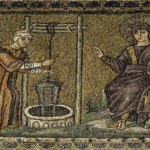We run our website the way we wished the whole internet worked: we provide high quality original content with no ads. We are funded solely by your direct support. Please consider supporting this project.
What To Do With the Violent God of the Old Testament
For eight years Greg has been researching for and writing the book entitled The Crucifixion of the Warrior God. In it he confronts the commonly held idea that the Old Testament depictions of God behaving violently should be held alongside of and equal to the God revealed through Jesus dying on the cross. But if the Old Testament is inspired by God, then what are we to do with the violent portraits of God found there? Greg gives a brief answer to this question here in a video produced by The Work of the People.
If you are wondering when the book will be available, it’s almost done and about to go to the publisher.
Category: General
Tags: Bible, Crucifixion of the Warrior God, Cruciform Theology, Jesus, OT Violence
Topics: Interpreting Violent Pictures and Troubling Behaviors
Related Reading

Jesus: Our Vision of God
At the beginning of his Gospel John taught that “no one has ever seen God, but the one and only Son, who is himself God and is in closest relationship with the Father, has made him known” (Jn 1:18). He is claiming that, outside of Christ, no one has ever truly known God. In the…

That Weird Episode with the Pigs
In my opinion, the single strangest episode recounted in the Gospels is the account of Jesus’ encounter with a demonized man that ended with two thousand pigs drowning themselves in the Sea of Galilee (Mk 5:1-10//Mt 8:28-34; Lk 8:26-39). Some find it morally objectionable that this mass suicide was the result of Jesus allowing the…

How do you respond to Bart Ehrman’s book, “Misquoting Jesus”?
Question: I just read Bart Ehrman’s book Misquoting Jesus and it’s sort of rocked my world. How can we believe the Bible is God’s inerrant Word when we don’t even know what the original Bible said? Answer: I actually went to graduate school with Bart Ehrman (at Princeton). We used to smoke pipes together up…

The Twist that Reframes the Whole Story
Many people read the Bible as if everything written within it is equally authoritative. As a result, people read it along the lines of a cookbook. Like a recipe, the meaning and authority of a passage aren’t much affected by where the passage is located within the overall book. The truth, however, is that the…

Sin-Bearing God
On the cross, God became our sin, as Paul wrote: “God made him who had no sin to be sin for us” (2 Cor 5:21). However, God didn’t begin to be a sin-bearing God when Jesus walked the earth and hung on the cross. Rather he became Incarnate and bore our sins on the cross…

Jesus and the “Favored Nation”
Nationalism lies at the heart of the Old Testament narrative. This concept is intimately wrapped up with the law-oriented covenant God made with the Israelites at Mount Sinai, for at the heart of this covenant is the promise that obedience would bring national security while disobedience would bring national disaster (Deut. 27-28). What we shall…
